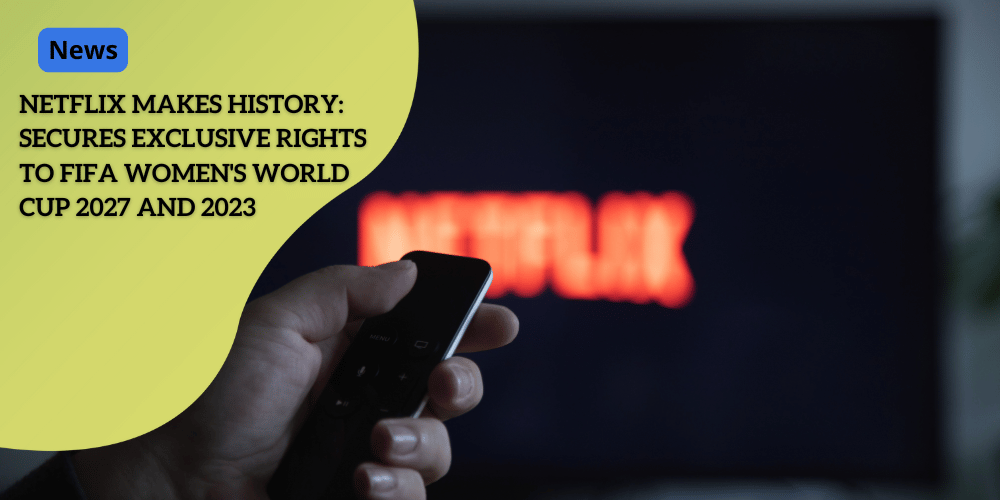Netflix Makes History: Secures Exclusive Rights to FIFA Women’s World Cup 2027 and 2023

Anúncios
Landmark Broadcasting Deal Announcement
Netflix has once again made headlines, securing the exclusive US broadcasting rights for the FIFA Women’s World Cups in 2027 and 2031.
This move signifies the streaming giant’s commitment to expanding its live sports content and reflects the growing prominence of women’s sports on a global scale.
Anúncios
A Historic Partnership
The deal marks Netflix’s largest foray into live sports to date, as emphasized by FIFA President Gianni Infantino.
He described the agreement as a “landmark moment for sports media rights,” highlighting the significance of the partnership in promoting women’s football worldwide.
Anúncios
The anticipation surrounding the 2027 tournament is palpable, with Brazil confirmed as the host nation, promising a vibrant and unforgettable event.
Meanwhile, the location for the 2031 World Cup remains to be determined, adding to the excitement and speculation.
What’s in It for Netflix?
For Netflix, this deal is about more than just broadcasting matches.
According to Chief Content Officer Bela Bajaria, the streaming service aims to celebrate the players, culture, and passion that fuel the rise of women’s sports globally.
This approach aligns seamlessly with Netflix’s broader strategy to diversify its content offerings and tap into the burgeoning market for live sports.
By securing such a high-profile event, Netflix is poised to become a significant player in the sports broadcasting arena.
Implications for Women’s Football
This landmark deal sends a strong message about the commercial value and global significance of women’s football.
As Infantino pointed out, the partnership with Netflix underscores the belief that the FIFA Women’s World Cup is not just a major sporting event, but a cultural phenomenon.
Financial terms of the deal have not been disclosed, but the implications are clear: women’s football is a lucrative and growing market.
The collaboration between FIFA and Netflix is a testament to the mutual recognition of the tournament’s potential to reach and inspire millions of viewers.
The comprehensive coverage planned by Netflix promises to provide a deeper look into the stories that make up the tournament, from the athletes’ personal journeys to the cultural celebrations of the host nations.
 Women’s football is growing more and more
Women’s football is growing more and more
A Step Forward for Sports Media
Netflix’s move to secure exclusive rights for the Women’s World Cup is a strategic leap forward in its venture into live sports.
Following successful deals with the NFL for Christmas Day games and WWE’s Monday Night Raw, and the streaming of the Mike Tyson vs. Jake Paul boxing match which reached 60 million households, this acquisition solidifies Netflix’s commitment to live sports content.
This chapter in Netflix’s evolution marks a pivotal moment in sports media, blending the platform’s streaming expertise with the rich legacy of the FIFA Women’s World Cup.
It sets a new standard for how sports can be experienced by fans around the world, offering unparalleled access and engagement.
As we look forward to future developments, the partnership between Netflix and FIFA sets the stage for exciting advancements in the broadcasting landscape, promising a richer, more immersive experience for sports enthusiasts everywhere.
Netflix’s Strategic Expansion into Live Sports
Netflix’s venture into sports broadcasting is part of a broader strategy to diversify its streaming content.
This move aims to attract and engage a wider audience. Netflix’s journey into live sports isn’t just about acquiring rights; it’s about making a significant impact in the sports broadcasting industry.
Bold Moves with NFL and WWE
Earlier this year, Netflix inked a deal to broadcast the NFL’s Christmas Day games over a three-year period.
The inaugural games feature matchups such as the Kansas City Chiefs vs. Pittsburgh Steelers and the Baltimore Ravens vs. Houston Texans.
These games are expected to attract millions of viewers, offering Netflix a substantial foothold in the highly competitive sports broadcasting market.
Adding to this momentum, Netflix finalized another major deal with WWE, becoming the home of WWE’s flagship show, Monday Night Raw, starting in 2025.
This deal, valued at over $5 billion, demonstrates Netflix’s commitment to live sports and entertainment.
By integrating WWE’s popular content, Netflix can tap into WWE’s immense and dedicated fan base.
The Tyson-Paul Spectacle
One of the most notable successes in Netflix’s foray into sports was the November boxing match between Mike Tyson and Jake Paul.
This event was a game-changer for Netflix, streamed by 60 million households worldwide.
Unlike traditional pay-per-view models, Netflix’s accessibility made it easier for a global audience to tune in, setting the stage for future live sports events on the platform.
Strategic Implications
These strategic moves indicate Netflix’s intent to become a major player in sports broadcasting.
By investing in high-profile events and leveraging its streaming technology, Netflix aims to offer unique and engaging experiences.
The FIFA Women’s World Cup broadcasting rights acquisition further underscores this strategy.
This landmark deal solidifies Netflix’s position as a key player in bringing significant sports events to a global audience.
This focus on live sports presents an opportune moment for Netflix to not only diversify its service but also enhance its subscription value.
As Netflix continues to innovate and expand, the next chapters in its sports broadcasting journey will undoubtedly be exciting to follow.
Women’s World Cup Market Potential
The FIFA Women’s World Cup stands as the largest women’s sporting event globally, showcasing the pinnacle of talent and competition in women’s football.
The 2023 Women’s World Cup final, held in Australia, epitomized the event’s massive appeal.
More than two million viewers in the United States were glued to their screens as Spain triumphed over England, with the match being broadcast on FOX and Telemundo.
This significant viewership bears testament to the growing popularity and commercial potential of women’s football worldwide.
A Rising Tide of Viewership
The viewership statistics from the 2023 tournament further underscore the robust market potential of the Women’s World Cup.
Despite the US Women’s National Team (USWNT) making an earlier-than-expected exit after a loss to Sweden in the Round of 16, their matches garnered an average of 3.8 million viewers.
This substantial audience confirms the high level of interest and engagement that US fans have with women’s soccer, solidifying the sport’s foothold in the competitive sports broadcasting arena.
Growing Global Prestige
The Women’s World Cup’s increasing visibility has continuously propelled women’s football into the spotlight.
Each tournament builds upon the last, not just in terms of athletic excellence, but also in global recognition and commercial viability.
For instance, the excitement surrounding the selection of Brazil as the host nation for the 2027 edition has already generated buzz, promising an electrifying atmosphere and robust viewership.
The location for the 2031 World Cup is yet to be decided, but anticipation is rife given the trend of escalating interest.
Economic and Sociocultural Impacts
This burgeoning interest and viewership have broad implications beyond just the numbers.
Economically, the growing popularity paves the way for lucrative sponsorship deals, advertising revenues, and ancillary income streams.
Socioculturally, it offers a platform for discussions around gender equality in sports, providing role models for aspiring female athletes and encouraging greater societal support for women’s sports.
As Netflix positions itself at the forefront of sports broadcasting with its acquisition of exclusive US rights for the 2027 and 2031 Women’s World Cups, the streaming giant is poised to capitalize on this upward trend.
The partnership with FIFA underscores the recognition of women’s football’s commercial value and cultural importance on a global scale.
This venture is aligned with Netflix’s strategic expansion into live sports, reflecting the platform’s commitment to diversified, rich content that resonates with a global audience.
The future looks bright for women’s football, with Netflix’s involvement likely to amplify its reach and impact.
The story doesn’t end here; the journey of celebrating the players, their stories, and the cultural tapestry of women’s sports continues to unfold in exciting ways.
Future Vision and Impact
Netflix’s acquisition of the exclusive US broadcasting rights for the 2027 and 2031 FIFA Women’s World Cups marks a defining moment for both the streaming giant and the sport of women’s soccer.
This strategic move underscores the increasingly significant commercial value of women’s sports and highlights Netflix’s innovative approach to content development.
A Comprehensive Approach to Broadcasting Women’s Sports
Netflix aims to deliver an all-encompassing viewing experience that extends beyond the matches themselves.
Bela Bajaria, Netflix’s Chief Content Officer, has articulated a vision where the platform not only streams the games but also delves deep into the players’ stories, the culture surrounding the sport, and the sheer passion that fuels women’s soccer.
This holistic strategy intends to provide an immersive experience that showcases the dedication and enthusiasm of athletes, offering viewers a richer, more engaging connection to the sport US Broadcasting Rights.
Validating the Commercial Potential of Women’s Football
This broadcasting deal serves as a significant endorsement of the commercial potential of women’s football.
The FIFA Women’s World Cup has demonstrated its considerable appeal and market value, with the 2023 final drawing over 2 million viewers on FOX and Telemundo, and the US Women’s National Team matches averaging 3.8 million viewers.
This rising interest highlights the evolving landscape where women’s sports are gaining traction, both in terms of audience engagement and financial viability.
By securing exclusive rights, Netflix is making a statement about the economic potential and cultural significance of women’s football in the global sports arena.
Reinforcing the Global Significance of the Tournament
Netflix’s acquisition is particularly notable as it is the first full competition they have acquired.
This move not only enhances the platform’s content portfolio but also reinforces the global significance of the FIFA Women’s World Cup.
The tournament stands as the premier event in women’s sports, and Netflix’s involvement will likely elevate its visibility and influence even further.
By bringing the competition to a streaming audience, the platform can reach new viewers and enhance its standing as a major player in sports broadcasting.
Concluding this chapter offers a glimpse into Netflix’s broader aspirations within the dynamic field of live sports broadcasting.
The approach promises to elevate not just the content but the very narrative surrounding women’s sports, offering a transformative perspective that could influence how sports media rights deals are approached in the future.






